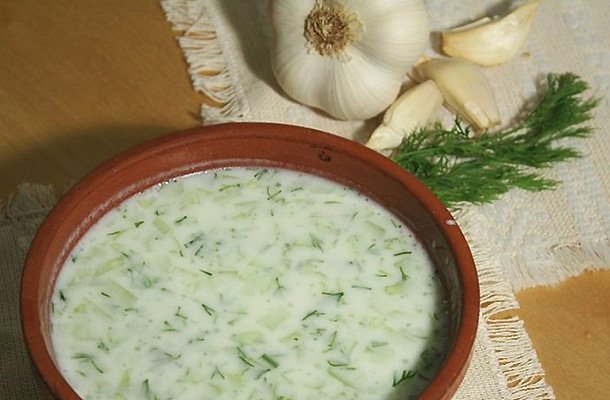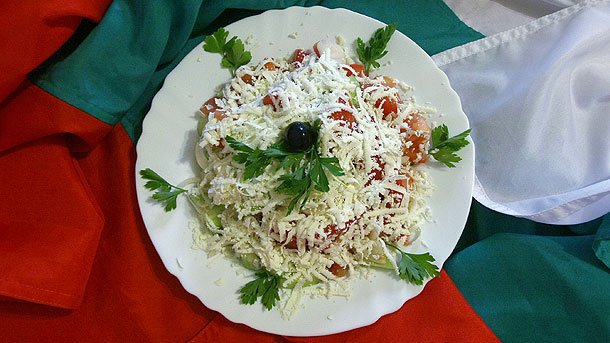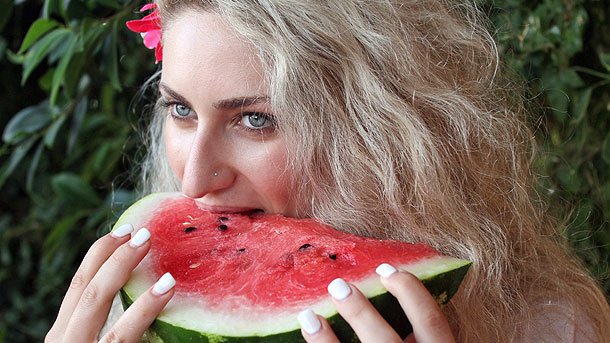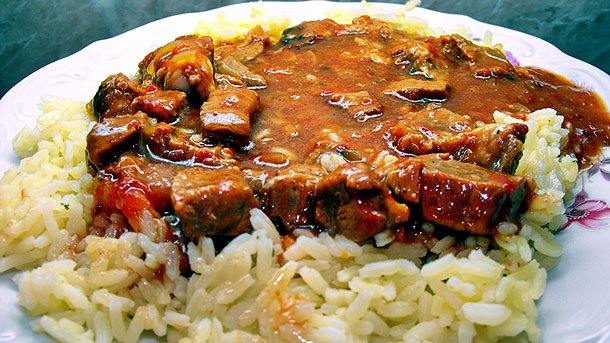Peppers stuffed with rice or with white feta cheese and eggs, fried courgettes with yoghourt, garlic and dill, chicken or spinach soup, potato balls, a salad from chili peppers with parsley and garlic… All this is only a part of the diverse diet that Bulgarians opt for on hot summer days. Throughout August the air in towns and villages fills with the appetizing scent of roasted peppers. And these are absolutely delicious if consumed with tomato sauce with garlic and parsley.

© Photo: bg.wikipedia.org
Under the scorching sun when mercury hits 40C, anyone is willing to escape the excessive heat. Some head to the seaside, others go for the coolness of the mountain, but no matter where they go, Bulgarians really love to have their favorite tarator, a dietary symbol of the local summers. The Spaniards have their gaspaccio, the Russians, the popular okroshka, and we, Bulgarians, the traditional cold soup made from yoghurt with some cold water, finely chopped cucumbers, a lot of dill, garlic and walnuts. Diliana Ilcheva, manager of a food chain, explains that in the summer tarator is prepared in huge quantities. More about the celebrated Bulgarian tarator, from Maria Petrova, chef at a Sofia-based restaurant:
“In times of old, when people reaped the harvest in the scorching heat, they made tarator with water, chopped cucumber and vinegar. My grandmother used to tell me that the meal was called ‘harvest tarator’. Later in time, yoghurt was added to this quite simple soup. It quenched the thirst in the heat and is a purely Bulgarian meal, just like the famous Shopska salad.”

© Photo: BGNES
Shopska is Bulgaria’s best known salad, despite some heated disputes over its origin, here in the Balkans. This salad is a mix of tomatoes, red roasted peppers, cucumbers, onion, parsley and grated white feta cheese. In fact it dates back to the communist times, in the 1970s, when part of Bulgaria’s strategy was to make itself more appealing to foreign tourists with typically Bulgarian food.
However, let us now ask Maria Petrova what is the diet of her family in the summer. We eat mostly meatless meals, with a lot of cheese. It has turned out that her sons are fussier than the customers at the restaurant where she cooks. What is the Bulgarians’ diet during summertime? Let us listen to the professionals.
“Well, they love everything, with or without meat. To our surprise there is no retreat from meat during this season”, Diliana Ilcheva says. “We tend to think that people tend to choose vegetarian meals during the summer but this is a common fallacy. It is only women who prefer vegetables to meat.”

© Photo: EPA / BGNES
Bulgarians eat a lot of salads. Interestingly, green salads are less preferred in the summer. Now there is greater demand for tomatoes, cucumbers and even cabbage salads, Diliana Ilcheva explains. Chef Maria Petrova adds that Bulgarians love stuffed vegetables, such as courgettes, peppers and aubergines. Beans and lentils are traditional foods as well, she says. As for deserts, in the summer Bulgarians opt for melons and watermelons in the main. This is a must for the Bulgarian summertime diet!

© Photo: bg.wikipedia.org
Is there a popular dish common in the diets across the Balkans including Bulgaria?
“It is the kebab”, Diliana Ilcheva says. “Kebab is chopped, cut or minced meat made into an big oval ball with plenty of spices. The kebab is either on a spit, grilled or garnered with sauce. This is where the typically Bulgarian grilled kebabche (small kebab) originates from. Not only Bulgarians but also many foreigners like it very much”, Diliana Ilcheva concludes.
Translated by Daniela Konstantinova, konstantinova@bnr.bg
An innovation for the treatment of diabetic foot ulcer using the patient's own tissue and artificial intelligence has been implemented at the University Multi-profile Hospital for Active Treatment-Burgas. Bulgaria is the fourth European country to start..
Over 3.5 million Ukrainians have arrived in or passed through Bulgaria since the beginning of the war. Nearly 200,000 people have found temporary shelter in the country, announced Anna Tertychna from the Ukrainian Embassy in Bulgaria. She..
At the Bulgarian Embassy in London, Prof. Bettany Hughes presented excerpts from the new BBC series - Wonders of Bulgaria. Prof. Bettany Hughes is the author of two episodes of the documentary. Hughes is a historian, writer, author of..
The village of Zmeyovo near the town of Stara Zagora is celebrating today, December 21, its traditional Festival of Pelin Wine. According to an..
Each piece evokes warmth and nostalgia because each is handmade and unique. The silvery reflections on the glass baubles take us back to childhood, when..
The making of knitted products is a traditional craft that deserves a revival and a new life, believes Alexandrina Pandurska, known for her numerous..

+359 2 9336 661
